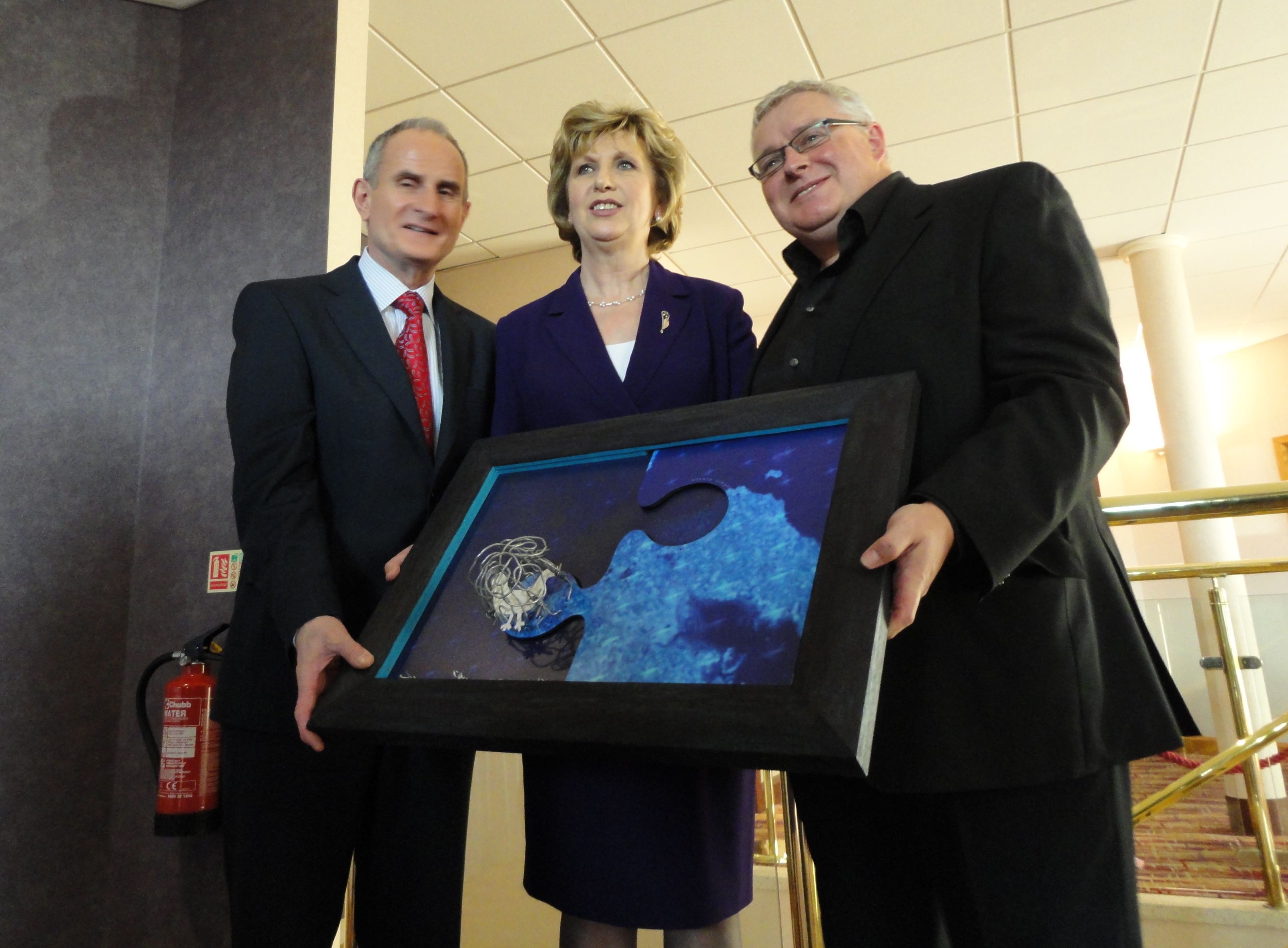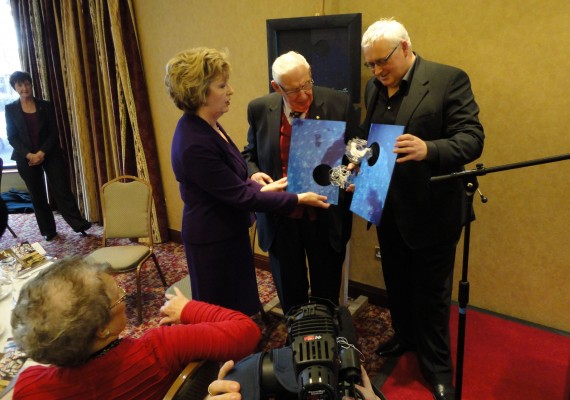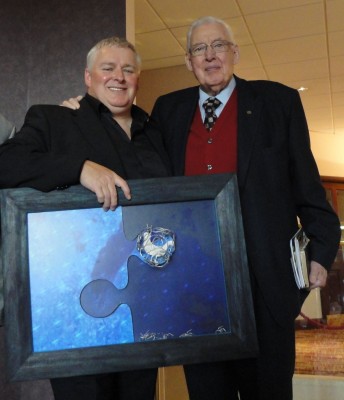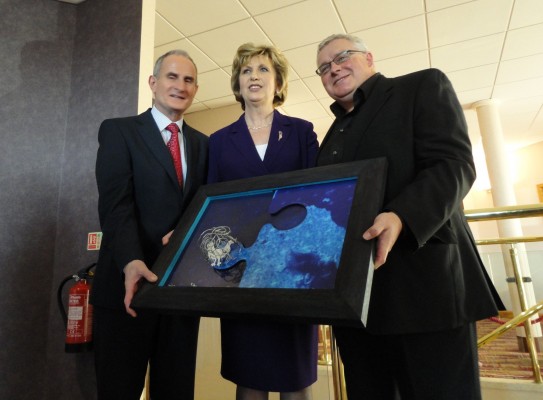If you listened to Thought for the Day on Radio Ulster yesterday, you’d have been aware that Tuesday was the Feast of Saint Columbanus. The speaker described him as “a bit of a stirrer”. Which set the tone for the lunchtime celebration of Columbanus organised by the Ullans Academy in an East Belfast hotel and featuring speeches from academy president Dr Ian Adamson, Lord Bannside and the Irish President.
As far as I can tell, the Ullans Academy is very much on the liberal wing of the innumerable organisations that represent and promote Ulster Scots culture. It points to shared culture and history, from Scotland and through Ireland. It’s not hung up on equality or parity, and it’s about inclusion rather than exclusion.
Tuesday lunchtime’s event – one of a regular series – brought together people from all sections of the community, for the most part mixing easily with each other. Presidents, preachers, politicians, ex-paramilitaries, community workers, teachers, school children (from Ashfield Girls School and St Joseph’s College), political advisors and the odd blogger. MLAs, councillors and candidates from a number of parties across the political spectrum. Lord Bannside and Baroness Paisley sitting at the same table as the Irish President and her husband “the lovely Martin”. But no sign of the culture minister Nelson McCausland.
Columbanus died on this day in 615 AD. Big celebrations are predicted in Italy – where he’s buried – in 2015. As someone who hasn’t spent much time in Bangor, I hadn’t realised that he’d had spent time there and was a local hero. Ian Adamson has written a twelve page booklet summarising the life and impact of Columbanus. He quipped: “I’ve dumbed down this brochure so the academics can read it!” before going on to claim that Columbanus was “probably the greatest of all the Irish saints, in that he re-evangelised Europe at the time of the fall of the Roman Empire.”
The speeches both set a tone of the need to and value of exploring shared history.
Local artist and lecturer Ian Fleming had been commissioned to produce a piece of art to give to the two special guest speakers. At first refusing to produce two copies of the same work, he instead created two interlocking jigsaw pieces that can be lifted out of their frames and locked together. Columbanus means “white dove” and it’s present on the two pieces, locked in a cage of “decommissioned” barbed wire. The Belfast Lough coastline and Bangor are also represented on Lord Bannside’s half of the jigsaw.
I’m not sure that Ian Adamson’s hope that Ian Paisley and Mary McAleese “will come together very frequently so that they can slot each other’s pictures together” will come true.
Ian Adamson’s introduction finished with a deliberate (and stretched) comparison between Columbanus and Paisley.
Columbanus was a very complex character. One of the great scholars of his work said ‘he’s a character so complex, and so contrary, humble and haughty, harsh and yet very tender, pedantic and impetuous by turns, but he had as his unifying pattern the ambition of spreading the gospel of Christ in Western Europe … He was a missionary only through circumstance, a monk by vocation, a contemplative and wise man, but driven to action by the political world around him. He was a pilgrim on the road to paradise.’
And therefore it’s a particular pleasure that we have with us today a second Columbanus. I’ll not say which of those characteristics characterise our next speaker! But a very special person – perhaps the most significant political person in the whole of the end of the twentieth century we’ve just come through, and he has a particular interest in Columbanus and the old Celtic church. I speak of course of Dr Ian Paisley …
Lord Bannside started his short contribution by describing Columbanus as a “great saint” who “took a stand against things which were common in many of the churches of which he did not agree with and which he spoke out against”.
I think that this audience today and the fact that the president of the Irish Republic is with us and her husband – and she needs a husband – I think it’s interesting as it does send out a message and that message is clear that we need to go back to our history books and we need to learn some of the things we haven’t learned.
Many times in Irish history the emphasis has been upon those who have wanted to make that emphasis. But there are other things about Northern Ireland and the south of Ireland that we need to learn. And the one we come to think about today – Columbanus – we come to think of him today. And what a man he was.
He didn’t go with the times. He didn’t say I will visit the Pope and get my orders and then I will do what he says. In fact, strange to relate, he had some very hot things to say about one of the then Popes. Things I wouldn’t even dare to say!
But he was an independent man. Why? Because those that know the truth, the truth shall set them free. And his writings and his teachings, but best of all his example was a witness to the apostolic gospel …
The Irish President Mary McAleese reckoned “it’s a strange company when we have Lord Bannside quoting a Pope and Columbanus, and Sammy Douglas quoting Saint Augustine. I feel in a very strange place today but in absolutely the right place!”
She asked whether there was “anything about this man, born fifteen hundred and seventy years ago, that could help us … on the journey that we’re all on together this day?” Some excerpts from her speech.
We’re always turning back to Saint Patrick, by far Ireland’s most influential immigrant. He was the stranger who came among us and who left that huge indelible imprint on Ireland so much so that he became the patron saint of Ireland. Columbanus could justifiably claim to be Ireland’s most influential emigrant, the man from this country who went out to the world. Of course born here, raised here, educated here. But he left his imprint not just here in Ireland but throughout Europe.
Though I have to say it’s not really a fair deal in my view that Patrick who didn’t come from here ends up being the patron saint of Ireland and Columbanus ends up being the patron saint of motorcyclists. It doesn’t seem like a very fair deal to me. If he was alive today he’d be straight down to the Equal Opportunities Commission I’m sure. And he might – given this gathering – take encouragement from the fact that he would have cross-community support.”
I was going to skirt rather delicately over Columbanus’ fidelity to the Pope. For obvious reasons it might arouse passions in some quarters, but thankfully Lord Bannside skirted over that anyway for me. And I was also going to skirt over the fact that he was also a man well known to protest at times to Popes. But again Lord Bannside took that and hit it right on the chin. So here is a man that we can all – no matter what our tradition, no matter our faith perspective – here is an Irish man that we can be proud of. He was an adventurous man, a courageous man, a man of faith, set out on a journey, long before the days of Ryanair, long before the days of Skype and email …
That Europe he travelled through was a mess. Probably an even bigger mess than certain Europe’s we’re more familiar with. It was riven with political tensions, rivalries, corruption, decadence, depraved leadership, conflict … you name it. The Europe that he travelled through had any amount of evidence of the messes that human beings are capable of.
His own words are inscribed on the wall of the Columbanus chapel in Saint Peter’s Basilica in Rome … ‘si tollis libertatem tollis dignitatem’ – if you take away human freedom you destroy human dignity. Or where human dignity flourishes, it flourishes because of freedom. And these words are probably to familiar to some of your ears because these words written by Columbanus a millennium ago are of course to be found in the first Article of the Charter of Fundamental Rights of the European Union. Taken straight from Columbanus: “Human dignity is inviolable. It must be respected and protected.”
We also do something very important more often than not now … And that is the way in which we now track back through history not using it in the way we were accustomed to, to ransack it for ammunition to hurl at each other, but looking at it now with different eyes to see what have we overlooked, where was the shared history that we could have created a common platform out of. Where were we able and where are we able to position ourselves so that we begin to look at the world through the same eyes.
I just like to think that we who have the benefit of fifteen hundred years of rather humbling hindsight now, unlike Columbanus who couldn’t see the future that we can look back on now. He believed that it could be a great future, he probably didn’t realise how long it was going to take for his words to really take hold of people’s hearts … We have the benefit of a direct limited experience of the devastating consequences of violence and intercommunal violence and now we have charge of the plant of peace … I think that would be the best thing we could do, to pledge ourselves as he did to live with the same passion, the same enthusiasm, to live every single day as if it was its last. Every single day dedicated and devoted to building up friendship between human beings, to making people understand that if you love one another, difficult though it may be, good things happen, wonderful things happen, miraculous things happen. That’s the message of Columbanus that we gather to celebrate this day. Enjoy each other’s company, the vary fact that we are around these tables is itself proof of the miracle.
You can read the full speeches and listen to the audio over on the Alan in Belfast blog.
Alan Meban. Tweets as @alaninbelfast. Blogs about cinema and theatre over at Alan in Belfast. A freelancer who writes about, reports from, live-tweets and live-streams civic, academic and political events and conferences. He delivers social media training/coaching; produces podcasts and radio programmes; is a FactCheckNI director; a member of Ofcom’s Advisory Committee for Northern Ireland; and a member of the Corrymeela Community.
Discover more from Slugger O'Toole
Subscribe to get the latest posts to your email.



